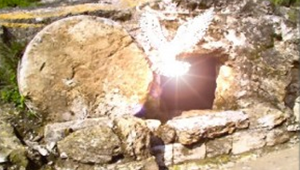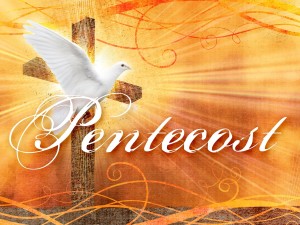God wants the church more “Pentecostal.” The world needs the church more “Pentecostal.” And, we will never be more than a faint shadow of “church” until we ourselves become way-more “Pentecostal.” Thus, I am praying and hoping the church  becomes more “Pentecostal.”
becomes more “Pentecostal.”
If I wrote this 40 years ago, I wouldn’t be writing it now. That’s because if I wrote this then, I would never have been ordained in my own church and might well have decided to do something else with my life. I’m confident this is true for at least two primary reasons. First, among the leaders of the church “Pentecostal” would have meant speaking in tongues, extraordinary signs and wonders, or at least claims for such, and any number of other reputedly strange things. Second, my mothers and fathers in the faith were afraid of such things, and some of them strongly suspected “signs and wonders” came from questionable sources.
That’s not what I mean, however, when I say God wants the church more “Pentecostal” (though I believe the authorities and my forebears were wrong on some of these points). What I do mean is this: fifty days after Jesus rose from the dead, four weeks after he completed his post-resurrection teachings on God’s kingdom, and ten days after he told them to wait and pray for the gift of power and Holy Spirit (Acts 1:8)—after all this there was “Pentecost.” That  is what I mean. Obviously, Jesus wanted his followers to be “Pentecostal” in that sense. I am inferring that Jesus wants the same for his followers today who are church. But “Pentecostal” means far more than what lies on the surface and is obvious.
is what I mean. Obviously, Jesus wanted his followers to be “Pentecostal” in that sense. I am inferring that Jesus wants the same for his followers today who are church. But “Pentecostal” means far more than what lies on the surface and is obvious.
When they became “Pentecostal” there were unusual experiences and uncommon phenomena. All at once, hurricane force winds blew into the room, fiery flames appeared and rested on each of them, Holy Presence flooded and filled them up, and a chorus of voices rose up and sounded forth. But the point is not so much that these occurred as it is what they signaled.
When they became “Pentecostal,” people from other parts of the world who had come to celebrate the Feast of Pentecost, and who were therefore different from each other and the followers of Jesus, heard this chorus of voices, this strange sound of music, and came to see what they were hearing. They all would have understood the Aramaic commonly spoken in Jerusalem and probably also the Greek commonly spoken throughout the empire. But instead of these, they heard multiple languages and among all the languages each one of them heard the one language that most deeply connected with her or his heart. A chorus of many languages, differentiated and targeted to the many varying hearts and minds, yet declaring the same wonders of God. From a distance it must have sounded confusing and chaotic, but closer it sounded symphonic—a creative blending of different voices in celebration of the wonders of God commonly extending to all.
When they became “Pentecostal,” dispersed nations were gathered to the same place, diverse tongues sang a new song, in more than four-part harmony, and disintegrated persons, families, tribes and worlds came together. All of this somehow generated by and radiating from this strange uttering of words that proclaimed the wonders of God.
That is to say, when they became “Pentecostal,” new creation happened. The Word that had become flesh did it again. This time making the “followers of the way” the place where the Holy One, whom no one can otherwise see, dwells in surprising and powerful ways. It was nothing less than re-creation of human persons and community that put the old creation on notice of its eventual eviction. And, more precisely, what was this notice? The inrushing and inhabiting wind and breath of God, enlivening a newly formed Body of human being that unites God and humans as well as heaven and earth.
That is to say, when they became “Pentecostal,” a new Exodus also happened. The one God who hears the groaning and anguished cries of enslaved people has sent a Deliverer who surprisingly accepts the chains that bind, engages the powers that forged them and maintain them, only then to break them once for all. Yes, once for all, so that former slaves are set free, former sinners are forgiven, and the once sinful slaves rise up as free born daughters and sons. New Exodus people, centered in worshipful adoration of their Redeemer God and empowered as agents of reconciling and conquering love.
That is to say, when they became “Pentecostal,” the kingdom of God took root in and among the “followers of the way,” as a sign that the kingdoms of this world had become the Kingdom of the One true God and of his Messiah, and as the demonstration of what it will be like when God governs all.
What are “the signs and wonders” that support such “Pentecostal” phenomena, of which many remain afraid even to this day as my forebears once were? They are clear and compelling in the story of the church. First, a community of people came into existence, a new creation, that made outsiders curious and respectful. The writer speaks of “favor” and “awe” from all the people (Acts 2:43, 47). That is, those who were not followers of Jesus could not explain what they were seeing other than to say that something powerful and palpable was going on, something paranormal, out of ordinary human experience, as if from another world. It wasn’t a great leap to suggest that among these people God was present and at work.
Second, when you looked closely at these people, outsiders must have wondered how and why they were together at all and why in this way? The members of these groups of followers were different and yet together as one. In some cases, they were so different that only conflict would normally result from being together. Yet, among them, there was communion. Conflict too, sometimes, but overwhelmingly communion. Somehow the differences in background, perspectives, preferences, and sub-cultures, had become subordinate to the common good. Another way to say it: they really had become a new kind of community, family, even ethnicity.
Third, that they were truly something new came to powerful expression in their spontaneous and sacrificial generosity. Several times we read that they were together such that they held everything in common. Nothing suggests this was a law or rule, but throughout we read of Spirit-spontaneity. They were free in the Spirit, free to share. That means they were free from selfishness, from fear of not having enough, and from doubt that God would provide for them. They were free to share radically. They shared what they had. Then, some sold what they had, so that the proceeds could be shared. Consequently, when anyone had a need it could be met by the loving generosity at work among them.
When the followers of Jesus became “Pentecostal,” in the aftermath of the wind, the fire, and the unusual utterances, there had indeed come into being a new kind of people who were free to love one another, even across assumed social and cultural boundaries, and thus to care for, and relate to one another in ways that were publicly observable, provocatively curious, and powerfully alluring.
If the record can be trusted, it happened because small groups of Jesus’ followers listened to Jesus’ instructions and waited, prayed, and expected. As a result, they became a visited and inhabited people, who reorganized their whole lives around the person, character, teachings, and responses of Jesus. They waited and prayed until Jesus’ Spirit came in power. It wasn’t magic. It was God who had given all, and was inviting a people to respond in kind.
So, I am praying for the church—my church—to be way more “Pentecostal!” Imagine our church being clearly “visited” and “inhabited” by a “presence” and “power” that make folks wonder. Imagine the wonder when they see that, in our church, all are embraced and welcomed, just as Jesus has done for us; when minority becomes majority and vice versa, because Jesus emptied himself, and stooped low to lift us all up. Imagine, a church famous for its forgiveness and gossiped about for the good news we insist on sharing with any and all. Imagine, the draw when healings regularly occur because followers of Jesus are gathered together and know how to confess their faults to one another, pray for one another and find healing. Imagine outsiders respecting and feeling awe because in our church we actually endeavor to live in the Jesus way—not fearful but trusting, not grasping but generous, not angry but patient, and not agitated when others disappoint. Imagine if the skeptical and unconvinced, and even a few who adamantly oppose Jesus, saw that we really did believe that all authority in heaven and earth rested in Jesus’ hands, and Jesus is always with us. Imagine it.
God wants the church way more “Pentecostal!”